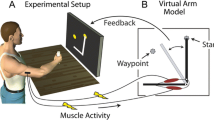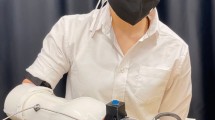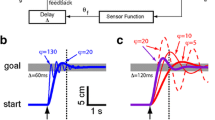Abstract
Prosthesis disuse and abandonment is an ongoing issue in upper-limb amputation. In addition to lost structural and motor function, amputation also results in decreased task-specific sensory information. One proposed remedy is augmenting somatosensory information using vibrotactile feedback to provide tactile feedback of grasping objects. While the role of frontal and parietal areas in motor tasks is well established, the neural and kinematic effects of this augmented vibrotactile feedback remain in question. In this study, we sought to understand the neurobehavioral effects of providing augmented feedback during a reach-grasp-transport task. Ten persons with sound limbs performed a motor task while wearing a prosthesis simulator with and without vibrotactile feedback. We hypothesized that providing vibrotactile feedback during prosthesis use would increase activity in frontal and parietal areas and improve grasp-related behavior. Results show that anticipation of upcoming vibrotactile feedback may be encoded in motor and parietal areas during the reach-to-grasp phase of the task. While grasp aperture is unaffected by vibrotactile feedback, the availability of vibrotactile feedback does lead to a reduction in velocity during object transport. These results help shed light on how engineered feedback is utilized by prostheses users and provide methodologies for further assessment in advanced prosthetics research.





Similar content being viewed by others
Availability of data and material
The datasets generated during and/or analyzed during the current study are available in the SMARTech repository, https://doi.org/10.35090/gatech/66286.
Code availability
Code to process the datasets are available in the SMARTech repository, https://doi.org/10.35090/gatech/66286.
References
Antfolk C, D’Alonzo M, Rosén B, Lundborg G, Sebelius F, Cipriani C (2013) Sensory feedback in upper limb prosthetics. Expert Rev Med Devices 10(1):45–54. https://doi.org/10.1586/erd.12.68
Bhaskaranand K, Bhat AK, Acharya KN (2003) Prosthetic rehabilitation in traumatic upper limb amputees (an Indian perspective). Arch Orthop Trauma Surg 123(7):363–366. https://doi.org/10.1007/s00402-003-0546-4
Biddiss E, Chau T (2007a) Upper-limb prosthetics: critical factors in device abandonment. Am J Phys Med Rehabil 86(12):977–987. https://doi.org/10.1097/PHM.0b013e3181587f6c
Biddiss E, Chau T (2007b) Upper limb prosthesis use and abandonment: a survey of the last 25 years. Prosthet Orthot Int 31(3):236–257. https://doi.org/10.1080/03093640600994581
Bingham GP, Muchisky MM (2018) “Center of Mass Perception”: affordances as dispositions determined by Dynamics. In: Flach J, Hancock P, Caird J, Vicente K (eds) Global perspectives on the ecology of human-machine systems, 1st edn. CRC Press, Boca Raton, pp 359–395. https://doi.org/10.1201/9780203753095-12
Blakemore S-J, Frith CD, Wolpert DM (2001) The cerebellum is involved in predicting the sensory consequences of action. NeuroReport 12(9):1879–1884. https://doi.org/10.1097/00001756-200107030-00023
Bouwsema H, Kyberd PJ, Hill W, van der Sluis CK, Bongers RM (2012) Determining skill level in myoelectric prosthesis use with multiple outcome measures. J Rehabil Res Dev 49(9):1331–1347. https://doi.org/10.1682/Jrrd.2011.09.0179
Brickwedde M, Krüger MC, Dinse HR (2019) Somatosensory alpha oscillations gate perceptual learning efficiency. Nat Commun 10(1):263. https://doi.org/10.1038/s41467-018-08012-0
Chatterjee A, Aggarwal V, Ramos A, Acharya S, Thakor NV (2007) A brain-computer interface with vibrotactile biofeedback for haptic information. J Neuroeng Rehabil 4(1):40. https://doi.org/10.1186/1743-0003-4-40
Chieffi S, Gentilucci M (1993) Coordination between the transport and the grasp components during prehension movements. Exp Brain Res. https://doi.org/10.1007/BF00230205
Clemente F, D’Alonzo M, Controzzi M, Edin BB, Cipriani C (2016) Non-invasive, temporally discrete feedback of object contact and release improves grasp control of closed-loop myoelectric transradial prostheses. IEEE Trans Neural Syst Rehabil Eng 24(12):1314–1322. https://doi.org/10.1109/TNSRE.2015.2500586
Cordella F, Ciancio AL, Sacchetti R, Davalli A, Cutti AG, Guglielmelli E, Zollo L (2016) Literature review on needs of upper limb prosthesis users. Front Neurosci. https://doi.org/10.3389/fnins.2016.00209
Crapse TB, Sommer MA (2008) Corollary discharge circuits in the primate brain. Curr Opin Neurobiol 18(6):552–557. https://doi.org/10.1016/j.conb.2008.09.017
Cusack WF, Cope M, Nathanson S, Pirouz N, Kistenberg R, Wheaton LA (2012) Neural activation differences in amputees during imitation of intact versus amputee movements. Front Hum Neurosci. https://doi.org/10.3389/fnhum.2012.00182
Cutkosky MR (1989) On grasp choice, grasp models, and the design of hands for manufacturing tasks. IEEE Trans Robot Autom 5(3):269–279. https://doi.org/10.1109/70.34763
Delorme A, Makeig S (2004) EEGLAB: an open source toolbox for analysis of single-trial EEG dynamics including independent component analysis. J Neurosci Methods 134:9–21. https://doi.org/10.1016/j.jneumeth.2003.10.009
Engels LF, Shehata AW, Scheme EJ, Sensinger JW, Cipriani C (2019) When less is more—discrete tactile feedback dominates continuous audio biofeedback in the integrated percept while controlling a myoelectric prosthetic hand. Front Neurosci 13:578. https://doi.org/10.3389/fnins.2019.00578
Fell J, Axmacher N (2011) The role of phase synchronization in memory processes. Nat Rev Neurosci 12(2):105–118. https://doi.org/10.1038/nrn2979
Flanagan JR, Bowman MC, Johansson RS (2006) Control strategies in object manipulation tasks. Curr Opin Neurobiol 16(6):650–659. https://doi.org/10.1016/j.conb.2006.10.005
Frenkel-Toledo S, Bentin S, Perry A, Liebermann DG, Soroker N (2013) Dynamics of the EEG power in the frequency and spatial domains during observation and execution of manual movements. Brain Res 1509:43–57. https://doi.org/10.1016/j.brainres.2013.03.004
Gazzaniga MS (2009) The cognitive neurosciences. MIT press, Cambridge
Gentilucci M, Toni I, Chieffi S, Pavesi G (1994) The role of proprioception in the control of prehension movements: a kinematic study in a peripherally deafferented patient and in normal subjects. Exp Brain Res 99(3):483–500
Grosskopf A, Kuhtz-Buschbeck JP (2006) Grasping with the left and right hand: a kinematic study. Exp Brain Res 168(1–2):230–240. https://doi.org/10.1007/s00221-005-0083-1
Hasson CJ, Manczurowsky J (2015) Effects of kinematic vibrotactile feedback on learning to control a virtual prosthetic arm. J Neuroeng Rehabil 12:31. https://doi.org/10.1186/s12984-015-0025-5
Hoff B, Arbib MA (1993) Models of trajectory formation and temporal interaction of reach and grasp. J Mot Behav 25(3):175–192
Jeannerod M (1984) The timing of natural prehension movements. J Mot Behav 16(3):235–254
Johansson R, Flanagan J (2009) Coding and use of tactile signals from the fingertips in object manipulation tasks. Nat Rev Neurosci 10(5):345–359. https://doi.org/10.1038/nrn2621
Johnson-Frey SH (2003) What’s so special about human tool use. Neuron 39(2):201–204
Johnson-Frey SH, Newman-Norlund R, Grafton ST (2005) A distributed left hemisphere network active during planning of everyday tool use skills. Cereb Cortex 15(6):681–695. https://doi.org/10.1093/cercor/bhh169
Kothe C, Jung TP (2014) Artifact removal techniques with signal reconstruction (U.S. Patent Application No. 14/895,440). U.S. Patent and Trademark Office. https://patents.google.com/patent/US20160113587A1/en
Kreimeier J, Hammer S, Friedmann D, Karg P, Bühner C, Bankel L, Götzelmann T (2019) Evaluation of different types of haptic feedback influencing the task-based presence and performance in virtual reality. In: Proceedings of the 12th ACM International Conference on PErvasive Technologies Related to Assistive Environments, p 289–298. https://doi.org/10.1145/3316782.3321536
Kruger LM, Fishman S (1993) Myoelectric and body-powered prostheses. J Pediatr Orthop 13(1):68–75. https://doi.org/10.1097/01241398-199301000-00014
Li W, Xu Q, Li Y, Li C, Wu F, Ji L (2021) EEG characteristics in “eyes-open” versus “eyes-closed” condition during vibrotactile stimulation. Biomed Signal Process Control 68:102759. https://doi.org/10.1016/j.bspc.2021.102759
Maeda RS, Cluff T, Gribble PL, Pruszynski JA (2018) Feedforward and feedback control share an internal model of the arm’s dynamics. J Neurosci 38(49):10505–10514
Markovic M, Schweisfurth MA, Engels LF, Bentz T, Wüstefeld D, Farina D, Dosen S (2018) The clinical relevance of advanced artificial feedback in the control of a multi-functional myoelectric prosthesis. J Neuroeng Rehabil 15(1):28. https://doi.org/10.1186/s12984-018-0371-1
McFarland LV, Winkler SLH, Heinemann AW, Jones M, Esquenazi A (2010) Unilateral upper-limb loss: satisfaction and prosthetic-device use in veterans and servicemembers from Vietnam and OIF/OEF conflicts. J Rehabil Res Dev 47(4):299–316. https://doi.org/10.1682/Jrrd.2009.03.0027
Mizelle JC, Forrester L, Hallett M, Wheaton LA (2010) Electroencephalographic reactivity to unimodal and bimodal visual and proprioceptive demands in sensorimotor integration. Exp Brain Res 203(4):659–670. https://doi.org/10.1007/s00221-010-2273-8
Oldfield RC (1971) The assessment and analysis of handedness: the Edinburgh inventory. Neuropsychologia 9:97–113
Murguialday AR, Aggarwal V, Chatterjee A, Cho Y, Rasmussen R, O’Rourke B, Acharya S, Thakor NV, Ieee (2007) Brain-computer interface for a prosthetic hand using local machine control and haptic feedback. In: 2007 Ieee 10th International Conference on Rehabilitation Robotics, vols 1 and 2, p 609–613
Muthukumaraswamy S, Johnson BW (2004) Changes in rolandic mu rhythm during observation of a precision grip. Psychophysiology 41(1):152–156. https://doi.org/10.1046/j.1469-8986.2003.00129.x
Muthukumaraswamy S, Johnson BW, McNair NA (2004) Mu rhythm modulation during observation of an object-directed grasp. Cogn Brain Res 19(2):195–201. https://doi.org/10.1016/j.cogbrainres.2003.12.001
Nelson W (1983) Physical principles for economies of skilled movements. Biol Cybern 46(2):135–147. https://doi.org/10.1007/BF00339982
Oostenveld R, Oostendorp TF (2002) Validating the boundary element method for forward and inverse EEG computations in the presence of a hole in the skull. Hum Brain Mapp 17(3):179–192. https://doi.org/10.1002/hbm.10061
Oppenheim AV, Schafer RW, Buck JR (1999) Discrete-time signal processing, 1st edn. Prentice Hall, Upper Saddle River, NJ, pp 468
Østlie K, Lesjø IM, Franklin RJ, Garfelt B, Skjeldal OH, Magnus P (2012) Prosthesis use in adult acquired major upper-limb amputees: patterns of wear, prosthetic skills and the actual use of prostheses in activities of daily life. Disabil Rehabil Assist Technol 7(6):479–493. https://doi.org/10.3109/17483107.2011.653296
Palmer JA, Kreutz-Delgado K, Makeig S (2012) AMICA: an adaptive mixture of independent component analyzers with shared components. Swartz Center for Computatonal Neursoscience, University of California San Diego, Tech Rep, San Diego
Palmer CE, Davare M, Kilner JM (2016) Physiological and perceptual sensory attenuation have different underlying neurophysiological correlates. J Neurosci 36(42):10803–10812. https://doi.org/10.1523/JNEUROSCI.1694-16.2016
Parr JVV, Vine SJ, Harrison NR, Wood G (2018) Examining the spatiotemporal disruption to gaze when using a myoelectric prosthetic hand. J Mot Behav 50(4):416–425
Pena AE, Rincon-Gonzalez L, Abbas JJ, Jung R (2019) Effects of vibrotactile feedback and grasp interface compliance on perception and control of a sensorized myoelectric hand. PLoS ONE 14(1):e0210956. https://doi.org/10.1371/journal.pone.0210956
Percio CD, Infarinato F, Iacoboni M, Marzano N, Soricelli A, Aschieri P, Eusebi F, Babiloni C (2010) Movement-related desynchronization of alpha rhythms is lower in athletes than non-athletes: a high-resolution EEG study. Clin Neurophysiol 121(4):482–491. https://doi.org/10.1016/j.clinph.2009.12.004
Pfurtscheller G, Neuper C, Krausz G (2000) Functional dissociation of lower and upper frequency mu rhythms in relation to voluntary limb movement. Clin Neurophysiol 111(10):1873–1879
Pylatiuk C, Schulz S, Döderlein L (2007) Results of an Internet survey of myoelectric prosthetic hand users. Prosthet Orthot Int 31(4):362–370. https://doi.org/10.1080/03093640601061265
R Core Team (2017) R: A language and environment for statistical computing. Version 4.1.2. R Foundation for Statistical Computing, Vienna Austria. https://www.R-project.org
Sabes P (2000) The planning and control of reaching movements. Curr Opin Neurobiol 10(6):740–746. https://doi.org/10.1016/S0959-4388(00)00149-5
Santello M, Soechting JF (1998) Gradual molding of the hand to object contours. J Neurophysiol 79(3):1307–1320. https://doi.org/10.1152/jn.1998.79.3.1307
Saunders I, Vijayakumar S (2011) The role of feed-forward and feedback processes for closed-loop prosthesis control. J Neuroeng Rehabil 8(1):60. https://doi.org/10.1186/1743-0003-8-60
Sauseng P, Klimesch W, Schabus M, Doppelmayr M (2005) Fronto-parietal EEG coherence in theta and upper alpha reflect central executive functions of working memory. Intl J Psychophysiol 57(2):97–103. https://doi.org/10.1016/j.ijpsycho.2005.03.018
Shadmehr R, Krakauer JW (2008) A computational neuroanatomy for motor control. Exp Brain Res 185(3):359–381. https://doi.org/10.1007/s00221-008-1280-5
Sigala R, Haufe S, Roy D, Dinse HR, Ritter P (2014) The role of alpha-rhythm states in perceptual learning: insights from experiments and computational models. Front Comput Neurosci. https://doi.org/10.3389/fncom.2014.00036
Sivak B, MacKenzie CL (1990) Integration of visual information and motor output in reaching and grasping: The contributions of peripheral and central vision. Neuropsychologia 28(10):1095–1116. https://doi.org/10.1016/0028-3932(90)90143-c
Tejeiro C, Stepp CE, Malhotra M, Rombokas E, Matsuoka Y (2012) Comparison of remote pressure and vibrotactile feedback for prosthetic hand control. In: 2012 4th IEEE RAS & EMBS International Conference on Biomedical Robotics and Biomechatronics (BioRob), p 521–525
Wheaton LA, Nolte G, Bohlhalter S, Fridman E, Hallett M (2005a) Synchronization of parietal and premotor areas during preparation and execution of praxis hand movements. Clin Neurophysiol 116(6):1382–1390. https://doi.org/10.1016/j.clinph.2005.01.008
Wheaton LA, Shibasaki H, Hallett M (2005b) Temporal activation pattern of parietal and premotor areas related to praxis movements. Clin Neurophysiol 116(5):1201–1212. https://doi.org/10.1016/j.clinph.2005.01.001
Wheaton LA, Mizelle JC, Forrester LW, Bai O, Shibasaki H, Macko RF (2007) How does the brain respond to unimodal and bimodal sensory demand in movement of the lower extremity? Exp Brain Res 180(2):345–354
Wilcox R (2019) A robust nonparametric measure of effect size based on an analog of Cohen’s d, plus inferences about the median of the typical difference. J Modern Appl Stat Methods 17(2):jmasm.eP2726. https://doi.org/10.22237/jmasm/1551905677
Wing AM, Turton A, Fraser C (1986) Grasp size and accuracy of approach in reaching. J Mot Behav 18(3):245–260. https://doi.org/10.1080/00222895.1986.10735380
Witteveen HJ, Rietman HS, Veltink PH (2015) Vibrotactile grasping force and hand aperture feedback for myoelectric forearm prosthesis users. Prosthet Orthot Int 39(3):204–212. https://doi.org/10.1177/0309364614522260
Wolpert DM, Kawato M (1998) Multiple paired forward and inverse models for motor control. Neural Netw 11(7–8):1317–1329. https://doi.org/10.1016/S0893-6080(98)00066-5
Wolpert DM, Miall RC, Kawato M (1998) Internal models in the cerebellum. Trends Cogn Sci 2(9):338–347
Woolgar A, Zopf R (2017) Multisensory coding in the multiple-demand regions: vibrotactile task information is coded in frontoparietal cortex. J Neurophysiol 118(2):703–716. https://doi.org/10.1152/jn.00559.2016
Acknowledgements
The authors thank the research participants, without whom the study would not have been possible.
Funding
Partial funding by National Institutes of Health T32HD055180.
Author information
Authors and Affiliations
Contributions
JTJ, LAW and FLHIII contributed to study conception and design. Engineering was performed by JTJ. Data collection and analysis were performed by JTJ, DdM and HD. The manuscript was written by JTJ, and edited by LAW. All authors read and approved the final manuscript.
Corresponding author
Ethics declarations
Conflict of interest
The authors declare that they have no conflict of interest.
Ethics approval
Approved by the Georgia Tech Institutional Review Board, Protocol H16103.
Consent to participate
Informed consent was obtained from all individual participants included in the study.
Consent for publication
Not applicable. No personally identifiable information is presented.
Additional information
Communicated by Winston D Byblow.
Publisher's Note
Springer Nature remains neutral with regard to jurisdictional claims in published maps and institutional affiliations.
Supplementary Information
Below is the link to the electronic supplementary material.
Rights and permissions
About this article
Cite this article
Johnson, J.T., de Mari, D., Doherty, H. et al. Alpha-band activity in parietofrontal cortex predicts future availability of vibrotactile feedback in prosthesis use. Exp Brain Res 240, 1387–1398 (2022). https://doi.org/10.1007/s00221-022-06340-8
Received:
Accepted:
Published:
Issue Date:
DOI: https://doi.org/10.1007/s00221-022-06340-8




